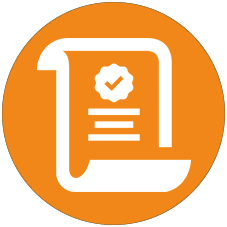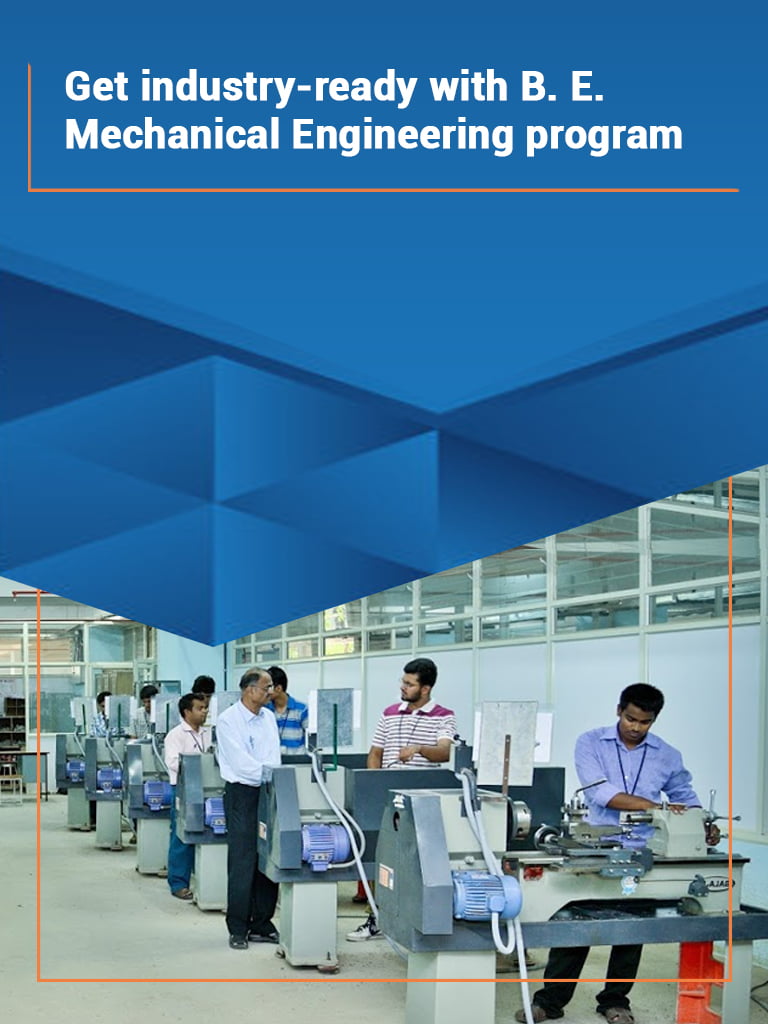
Duration
4 years
8 Semesters

Level
Undergraduate
Programme

About Programme
Mechanical Engineering is one of the oldest and broadest among engineering disciplines. The application base of Mechanical Engineering field of study is diverse and its scope is continuously expanding beyond the traditional boundaries. Mechanical Engineering applies the principles of Physics, Materials Science and Mathematics to the design, development, research, evaluation, manufacture, installation, testing, operation, maintenance and management of mechanical systems. Mechanical Engineers use these core principles along with tools like computer-aided engineering and product life-cycle management to design, analyze and develop manufacturing plants, industrial equipment and machinery, heating and cooling systems, transport systems, aircraft, watercraft, robotics, medical devices, and others.
Mechanical Engineers are employed in automotive, aerospace, chemical, computer, electronic, industrial machinery, manufacturing, mining, oceanographic, petroleum, pharmaceutical, power, printing, publishing, and textile industries. They use engineering principles to provide efficient solutions for the development of processes and products, ranging from small component designs to extremely large plants, machinery or vehicles.
Mechanical Engineers are focusing their attention towards new areas of research such as nanotechnology, development of composite materials, biomedical applications, environmental conservation, etc. overall, the field of Mechanical Engineering offers a wide range of job options to students, who are looking for a stable, stimulating and challenging career.

Programme Overview
After 2/3 year of graduation, the students of Mechanical Engineering Department will have the ability to:
- Apply principles of Mathematics, Science and Mechanical Engineering to design Mechanical Systems and Applications in Industry.
- Apply knowledge of Mechanical Engineering to solve problems of social relevance with concern for environment.
- Work with professional ethics as individuals and as team members in multi-disciplinary projects demonstrating creativity and leadership.
- Pursue higher education and research in advanced technology.
Engineering graduates will be able to:
- Engineering Knowledge: Apply the knowledge of mathematics, science, engineering fundamentals, and an engineering specialization to the solution of complex engineering problems.
- Problem Analysis: Identify, formulate, review research literature, and analyze complex engineering problems reaching substantiated conclusions, using first principles of mathematics, natural sciences, and engineering sciences.
- Design/Development of Solutions: Design solutions for complex engineering problems and design system components or processes that meet the specified needs with appropriate consideration for the public health and safety, and the cultural, societal, and environmental considerations.
- Conduct Investigations of Complex Problems: Use research-based knowledge and research methods including design of experiments, analysis and interpretation of data, and synthesis of the information to provide valid conclusions.
- Modern Tool Usage: Create, select, and apply appropriate techniques, resources, and modern engineering and IT tools including prediction and modeling to complex engineering activities with an understanding of the limitations.
- The Engineer and Society: Apply reasoning informed by the contextual knowledge to assess societal, health, safety, legal and cultural issues and the consequent responsibilities relevant to the professional engineering practice.
- Environment and Sustainability: Understand the impact of the professional engineering solutions in societal and environmental contexts, and demonstrate the knowledge of, and need for sustainable development.
- Ethics: Apply ethical principles and commit to professional ethics and responsibilities and norms of the engineering practice.
- Individual and Teamwork: Function effectively as an individual, and as a member or leader in diverse teams, and in multidisciplinary settings.
- Communication: Communicate effectively on complex engineering activities with the engineering community and with society at large, such as, being able to comprehend and write effective reports and design documentation, make effective presentations, and give and receive clear instructions.
- Project Management and Finance: Demonstrate knowledge and understanding of the engineering and management principles and apply these to one’s own work, as a member and leader in a team, to manage projects and in multidisciplinary environments.
- Life-Long Learning: Recognize the need for, and have the preparation and ability to engage in independent and life-long learning in the broadest context of technological change.
B.E. Degree in Mechanical Engineering
- Second year Pre-University or XII standard or equivalent examination recognized by the University (with Physics and Mathematics as compulsory subjects, along with any one of the following subjects namely: Chemistry, Bio-Technology, Computer Science, Biology and Electronics)
- Admission to the 2nd year/ 3rd semester Bachelor Degree in Engineering/ Technology (Lateral Entry) shall be opened to the candidates, who are holders of a diploma or equivalent qualification as recognized by University
- Mechanical Engineers have excellent career opportunities in various sectors such as Aerospace, Automotive, Manufacturing, Robotics, Industrial IoT, Biomedical, Chemical, Computers, Electronics, Fossil and Nuclear Power, Pharmaceuticals and Textiles.
- In the field of Research & Development, Design, Testing and Evaluation, Manufacturing, Operation and Maintenance, Marketing, Sales and Administration.
- In Public Sector Units like Railways, ONGC, Indian Oil, ISRO, SAIL, NTPC, DRDO and IAF.
- Internships and projects in Public and Private Sector Units like BEL, BEML, CPRI, TERI, Indian Oil, ISRO, IISc, Tata Motors, Bosch,

Why BNMIT for this course ?
1. Ultra model Center of Excellence which is recognized as a Pilot Center of Excellence by Toyota Kirloskar Motors Ltd. for training hands on with Toyota Engines
2. The Department provides an opportunity and industry exposure to the students convert their ideas and projects into Entrepreneurs /Startups
3. NBA has accredited the Department for the academic years 2018-19 to 2020-22 and valid up to 30.06.2025 and NAAC with A grade. The Institution has been recognized as Band Performer under ARIIA All India Ranking (2021-22).
4. Skill Development Programme is conducted by the department to complement student’s knowledge and skills in their core area, as per industry requirement to develop professional and futuristic skills
5. Mechanical Engineering Department comprises the state-of-art-laboratories, digital class room and seminar hall that are well equipped with most sophisticated instruments for better teaching learning process
6. Collaborated with many institutions of national importance, research organizations and foreign universities for faculty and student exchange programmes and internships.
7. Virtual lab established in department to enthuse students to conduct experiments by rousing their curiosity that would help them in learning basic and advanced concepts through remote experimentation
8. Scheme of providing monetary assistance to tune of 2.5 lakhs by New-Gen IEDC funded by GOI for student projects
9. Unique Innovative Project Lab (IPL) to nurture the budding engineers. Students are at liberty to conceptualize, design and implement solutions to societal problems with concerns for environment. Selected projects are converted into product prototypes under the guidance of ED cell.

Programme Curriculum
1st Semester (Chemistry Group)
| Course Code | Course |
| 18MAT11 | Calculus and Linear Algebra |
| 18CHE12 | Engineering Chemistry |
| 18CPS13 | C Programming for Problem Solving |
| 18ELN14 | Basic Electronics |
| 18ME15 | Elements of Mechanical Engineering |
| 18CHEL16 | Engineering Chemistry Laboratory |
| 18CPL17 | C Programming Laboratory |
| 18EGH18 | Technical English-I |
2nd Semester (Physics Group)
| Course Code | Course |
| 18MAT21 | Advanced Calculus and Numerical Methods |
| 18PHY22 | Engineering Physics |
| 18ELE23 | Basic Electrical Engineering |
| 18CIV24 | Elements of Civil Engineering and Mechanics |
| 18EGDL25 | Engineering Graphics |
| 18PHYL26 | Engineering Physics Laboratory |
| 18ELEL27 | Basic Electrical Engineering Laboratory |
| 18EGH28 | Technical English-II |
3rd Semester
| Course Code | Course |
| 17MAT31 | Transform Calculus, Fourier Series And Numerical Techniques |
| 17ME32 | Material Science |
| 17ME33 | Basic Thermodynamics |
| 17ME34 | Mechanics of Materials |
| 17ME35A/ 17ME35B | Metal Casting and Welding / Machine Tools and Operations |
| 17ME36A/ 17ME36B | Computer Aided Machine Drawing/ Mechanical Measurements and Metrology |
| 17MEL37A/ 17MEL37B | Material Testing lab/ Mechanical Measurements and Metrology lab |
| 17MEL38A/ 17MEL38B | Machine Shop / Foundry and Forging lab |
| 17KL/CPH39 /49 | Kannada/Constitution of India, Professional Ethics and Human Rights |
| 17MATDIP31 | Additional Mathematics – I (Lateral Entry Students) |
4th Semester
| Course Code | Course |
| 17MAT41 | Complex Analysis, Probability And Statistical Methods |
| 17ME42 | Applied Thermodynamics |
| 17ME43 | Fluid Mechanics |
| 17SC44 | Kinematics of Machines |
| 17ME45A/ 17ME45B | Metal Casting and Welding / Machine Tools and Operations |
| 17ME46A/ 17ME46B
| Computer Aided Machine Drawing/ Mechanical Measurements and Metrology |
| 17MEL47A/ 17MEL47B | Material Testing lab/ Mechanical Measurements and Metrology lab |
| 17MEL48A/ 17MEL48B | Machine Shop / Foundry and Forging lab |
| 17KL/CPH39 /49 | Kannada/Constitution of India, Professional Ethics and Human Rights |
| 17MATDIP41 | Additional Mathematics – II (Lateral Entry Students) |
5th Semester
| Course Code | Course |
| 17ME51 | Management and Engineering Economics |
| 17ME52 | Dynamics of Machinery |
| 17ME53 | Turbo Machines |
| 17ME54 | Design of Machine Elements – I |
| 17ME55X | Professional Elective-I |
| 17ME56X | Open Elective-I |
| 17MEL57 | Fluid Mechanics & Machinery Lab |
| 17MEL58 | Energy Lab |
| Professional Elective-I | Open Elective-I | ||
| 17ME551 | Refrigeration and Air-conditioning | 17ME561 | Optimization Techniques |
| 17ME552 | Theory of Elasticity | 17ME562 | Energy and Environment |
| 17ME553 | Human Resource Management | 17ME563 | Automation and Robotics |
| 17ME554 | Non Traditional Machining | 17ME564 | Project Management |
6th Semester
| Course Code | Course |
| 17ME61 | Finite Element Methods |
| 17ME62 | Computer integrated Manufacturing |
| 17ME63 | Heat Transfer |
| 17ME64 | Design of Machine Elements -II |
| 17ME65X | Professional Elective-II |
| 17ME66X | Open Elective –II |
| 17MEL67 | Heat Transfer Lab |
| 17MEL68 | Computer Aided Modelling and Analysis Lab |
| — | Internship |
| Professional Elective-II | Open Elective-II | ||
| 17ME651 | Computational Fluid Dynamics | 17ME661 | Energy Auditing |
| 17ME652 | Mechanics of Composite Materials | 17ME662 | Industrial Safety |
| 17ME653 | Metal Forming | 17ME663 | Maintenance Engineering |
| 17ME654 | Tool Design | 17ME664 | Total Quality Management |
| 17ME655 | Automobile Engineering | ||
7th Semester
| Course Code | Course |
| 17ME71 | Energy Engineering |
| 17ME72 | Fluid Power Systems |
| 17ME73 | Control Engineering |
| 17ME74X | Professional Elective – III |
| 17ME75X | Professional Elective-IV |
| 17MEL76 | Design Lab |
| 17MEP77 | Computer Integrated Manufacturing Lab |
| 17MEP78 | Project Work Phase – 1 |
| Internship |
| Professional Elective-III | Professional Elective-IV | ||
| 17ME741 | Design of Thermal Equipment’s | 17ME751 | Automotive Electronics |
| 17ME742 | Tribology | 17ME752 | Fracture Mechanics |
| 17ME743 | Financial Management | 17ME753 | Human Resource Management |
| 17ME744 | Design for Manufacturing | 17ME754 | Mechatronics |
| 17ME745 | Smart Materials & MEMS | 17ME755 | Advanced Vibrations |
8th Semester
| Course Code | Course |
| 17ME81 | Operations Research |
| 17ME82 | Additive Manufacturing |
| 17ME83X | Professional Elective – V |
| 17ME84 | Internship/ Professional Practice |
| 17ME85 | Project Phase II |
| 17MES86 | Technical Seminar |
| Professional Elective-V | |
| 17ME831 | Cryogenics |
| 17ME832 | Experimental Stress Analysis |
| 17ME833 | Theory of Plasticity |
| 17ME834 | Green Manufacturing |
| 17ME835 | Product life cycle management |
1st Semester (Chemistry Group)
| Course Code | Course |
| 18MAT11 | Calculus and Linear Algebra |
| 18CHE12 | Engineering Chemistry |
| 18CPS13 | C Programming for Problem Solving |
| 18ELN14 | Basic Electronics |
| 18ME15 | Elements of Mechanical Engineering |
| 18CHEL16 | Engineering Chemistry Laboratory |
| 18CPL17 | C Programming Laboratory |
| 18EGH18 | Technical English-I |
2nd Semester (Physics Group)
| Course Code | Course |
| 18MAT21 | Advanced Calculus and Numerical Methods |
| 18PHY22 | Engineering Physics |
| 18ELE23 | Basic Electrical Engineering |
| 18CIV24 | Elements of Civil Engineering and Mechanics |
| 18EGDL25 | Engineering Graphics |
| 18PHYL26 | Engineering Physics Laboratory |
| 18ELEL27 | Basic Electrical Engineering Laboratory |
| 18EGH28 | Technical English-II |
3rd Semester
| Course Code | Course |
| 18MAT31 | Transform Calculus, Fourier Series And Numerical Techniques |
| 18ME32 | Mechanics of Materials |
| 18ME33 | Basic Thermodynamics |
| 18ME34 | Material Science |
| 18ME35A/ 18ME35B | Metal cutting and forming/ Metal Casting and Welding |
| 18ME36A/ 18ME36B | Computer Aided Machine Drawing/ Mechanical Measurements and Metrology |
| 18MEL37A/ 18MEL37B | Material Testing lab/ Mechanical Measurements and Metrology lab |
| 18MEL38A/ 18MEL38B | Workshop and Machine Shop Practice (Consists of Fitting, and Machining)/ Foundry, Forging and Welding lab |
| 18CPH39 | Constitution of India, Professional Ethics and Human Rights |
| 18MATDIP31 | Additional Mathematics – I (Lateral Entry Students) |
4th Semester
| Course Code | Course |
| 18MAT41 | Complex Analysis, Probability And Statistical Methods |
| 18ME42 | Applied Thermodynamics |
| 18ME43 | Fluid Mechanics |
| 18SC44 | Kinematics of Machines |
| 18ME45A/ 18ME45B | Metal cutting and forming/ Metal Casting and Welding |
| 18ME46A/ 18ME46B
| Computer Aided Machine Drawing/ Mechanical Measurements and Metrology |
| 18MEL47A/ 18MEL47B | Material Testing lab/ Mechanical Measurements and Metrology lab |
| 18MEL48A/ 18MEL48B | Workshop and Machine Shop Practice (Consists of Fitting, and Machining)/ Foundry, Forging and Welding lab |
| 18KVK49 | Vyavaharika Kannada (Kannada for communication)/ |
| 18KAK49 | Aadalitha Kannada (Kannada for Administration) |
| 18MATDIP41 | Additional Mathematics – II (Lateral Entry Students) |
5th Semester
| Course Code | Course | |
| 18ME51 | Management and Economics | |
| 18ME52 | Design of Machine Elements I | |
| 18ME53 | Dynamics of Machines | |
| 18ME54 | Turbo Machines | |
| 18ME55 | Fluid Power Engineering | |
| 18ME56 | Operations Management | |
| 18MEL57 | Fluid Mechanics/Machines lab | |
| 18MEL58 | Energy Conversion Lab | |
| 18CIV59 | Environmental Studies | |
6th Semester
| Course Code | Course |
| 18ME61 | Finite Element Methods |
| 18ME62 | Design of Machine Elements II |
| 18ME63 | Heat Transfer |
| 18ME64X | Professional Elective -1 |
| 18ME65X | Open Elective –A |
| 18MEL66 | Computer Aided Modelling and Analysis Lab |
| 18MEL67 | Heat Transfer Lab |
| 18MEMP68 | Mini-project |
| — | Internship |
| Professional Elective -1 | ||
| Course code under18XX64X | Course Title | |
| 18CS641 | Non-Traditional Machining | |
| 18CS642 | Refrigeration and Air conditioning | |
| 18CS643 | Theory of Elasticity | |
| 18CS644 | Vibrations and Noise Engineering | |
| 18ME645 | Composite Materials Technology | |
| 18ME646 | Entrepreneurship Development | |
| Open Elective –(A Board and the Mechanical Department offering the Electives) | ||
| 18ME651 | Non-Conventional Energy Source | |
| 18ME652 | World Class Manufacturing | |
| 18ME653 | Supply Chain Management | |
| 18ME654 | Advanced Materials Technology | |
7th Semester
| Course Code | Course |
| 18ME71 | Control Engineering |
| 18ME72 | Computer Aided Design and Manufacturing |
| 18ME73X | Professional Elective – 2 |
| 18ME74X | Professional Elective – 3 |
| 18ME75X | Open Elective –B |
| 18MEL76 | Computer Integrated Manufacturing Lab |
| 18MEP77 | Design Lab |
| — | Project Work Phase – 1 |
| Internship |
| Professional Elective – 2 | ||
| Course code under 18ME73X | Course Title | |
| 18ME731 | Design for Manufacture | |
| 18ME732 | Automation and Robotics | |
| 18ME733 | Computational Fluid Dynamics | |
| 18ME734 | Total Quality Management | |
| 18ME735 | Operations Research | |
| Professional Electives – 3 | ||
| Course code under 18ME74X | Course Title | |
| 18ME741 | Additive Manufacturing | |
| 18ME742 | Emerging Sustainable Building Cooling Technologies | |
| 18ME743 | Theory of Plasticity | |
| 18ME744 | Mechatronics | |
| 18ME745 | Project Management | |
| Open Elective –B (Not for CSE / MEE Programs) | ||
| 18ME751 | Energy and Environment | |
| 18ME752 | Automotive Engineering | |
| 18ME753 | Industrial Safety | |
| 18ME754 | Optimization Techniques | |
8th Semester
| Course Code | Course |
| 18ME81 | Energy Engineering |
| 18ME82X | Professional Elective – 4 |
| 18MEP83 | Project Work Phase – 2 |
| 18MES84 | Technical Seminar |
| 18MEI85 | Internship |
| Professional Electives – 4 | |
| Course code under 18ME82X | Course Title |
| 18ME821 | CNC Machine Tools |
| 18ME822 | Tribology |
| 18ME823 | Non-Destructive Testing and Evaluation |
| 18ME824 | Automobile Engineering |
| 18ME825 | Tool Design |
| 18ME826 | Fracture Mechanics |

How To Apply ?
Route1: KCET (KEA)
- KCET- Counseling.
- Register for Counseling.
- Documents for Verification.
- Final Seat Selection.
Route 2: COMED-K
- COMED-K UGET- Counseling.
- Register for Counseling.
- Documents for Verification.
- Final Seat Selection.
Route 3: Management
Students can avail admission through management quota by filling application available on our website by clicking admission module. The institute does not encourage admissions through any agents or anybody other than college office and also has not entrusted any person or agency or support agency for making admission to the college. BNMIT will not be held responsible for any such kind of malicious claim of any person, agency or any supporting agents. Students and parents are clearly instructed not to approach any outsider and the college will not be responsible for it.



